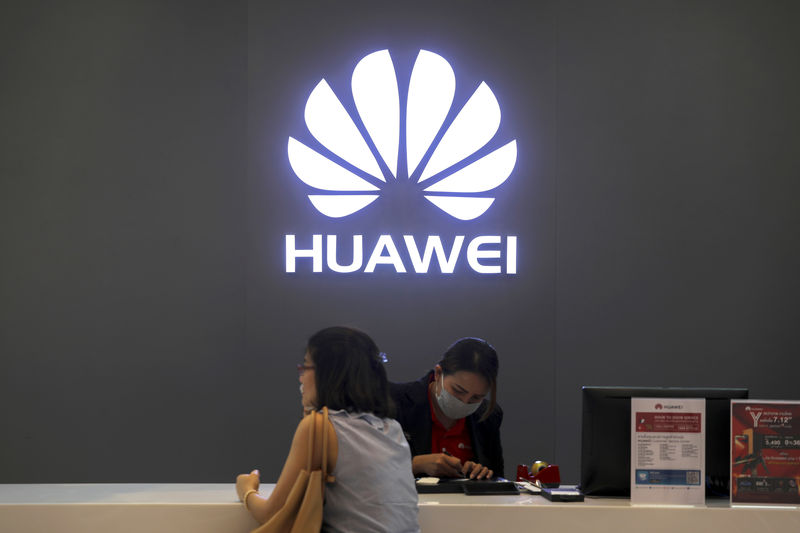(Bloomberg) -- Huawei Technologies Co. expects smartphone shipments to grow 20% next year even if it’s blocked from the latest Google (NASDAQ:GOOGL) software, suggesting the Trump administration efforts to contain the company’s rise may not be working.
The world’s largest smartphone maker after Samsung Electronics (KS:005930) Co. can rely on its massive home market and in-house software to keep the division humming, said Will Zhang, president of corporate strategy. Sourcing the hardware for smartphone manufacturing wasn’t a problem because of the availability of global supply, he told Bloomberg News.
Huawei is approaching a critical juncture in its fight for survival, six months after Washington barred it from buying key U.S. components and software without special licenses. Those include Google’s Android operating system, semiconductor design tools from Synopsys (NASDAQ:SNPS) Inc. and Cadence Design (NASDAQ:CDNS) Systems Inc. and radio frequency chips made by Qorvo and Skyworks (NASDAQ:SWKS). That threatens to dent Huawei’s smartphone business, which ships more than twice as many devices as Apple Inc (NASDAQ:AAPL)., while impeding its ability to make fifth-generation networking gear.
“There are many ways for our U.S. partners to find global solutions, rather than ship from a single U.S.-based source,” Zhang said at Huawei’s Shenzhen headquarters.
China’s largest technology corporation is a central facet of sensitive negotiations intended to defuse trade tensions with the U.S. Commerce Secretary Wilbur Ross has expressed optimism that the U.S. would strike a “Phase One” trade deal with China this month, adding that licenses would come “very shortly” for American companies to sell components to Huawei. Till then, the U.S. blacklist is exacting an uncertain toll on the Chinese networking giant.
Read more about the trade war: China Insists Trump Give Up His Favorite Trade Weapon -- Tariffs
Zhang said in the past Huawei set one target for smartphone shipments, but now because of increased uncertainty in the market it developed three different goals that include best and worst case scenarios. Under a moderate scenario, smartphone shipments could rise around 20% next year, he said. “Even for the pessimistic one, we see small growth,” said Zhang. The best case projection is for 40% growth.
Huawei, which gets roughly half of its revenue from its smartphone division, has so far managed to sustain an enviable pace of growth despite its precarious situation. It gained market share against Apple and Samsung in the third quarter by expanding smartphone shipments 29%. In its home market shipments jumped 66% in the third quarter but only rose about 18% sequentially abroad, according to Canalys. Huawei posted a 24% surge in revenue in the first nine months of 2019, boosted by a 26% jump in smartphone shipments to 185 million units.
Read more: TSMC to Keep Supplying Huawei, Quashes Talk of U.S. Pressure
Billionaire founder Ren Zhengfei once predicted the Trump administration’s move could knock $30 billion off his company’s revenue. That amount was later trimmed to $10 billion. Zhang revised down the total impact amount again on Tuesday. “Now I think it’s less than $10 billion,” he said. A significant part of that comes from Huawei’s server business, which he said had been expected to generate revenue of $8 billion this year. “But that will be cut in half,” he said, because Huawei was having difficulty making servers that employed the dominant x86 architecture used by U.S. giants Intel Corp (NASDAQ:INTC). and Advanced Micro Devices (NASDAQ:AMD) Inc. “Although servers are not our core product, every project involves one,” Zhang said.
He also said 20% to 40% of Huawei’s products were affected by the ban. “Some impact was small, so we could easily find a solution within half a year or three months. But for servers, it impacted our business, our revenue and our strategy for the future as well.”
Longer term, the company is exploring ways to get around a Google blockade. Huawei introduced its Mate 30 series in September, the first marquee phone that runs an open-source version of Android and lacks Google-licensed apps from Gmail to YouTube and Google Play Store.
Huawei is also developing its own operating system, HarmonyOS, which is designed primarily for Internet of Things devices but can also power smartphones. In September, the company offered $1.5 billion to lure global developers to create software for its own ecosystem.
Read more: FCC Wants to Know if Huawei Gear Is Near U.S. Military Bases
(Updates with the latest on trade deal in fifth paragraph.)
To contact Bloomberg News staff for this story: Gao Yuan in Beijing at ygao199@bloomberg.net;Peter Elstrom in Tokyo at pelstrom@bloomberg.net
To contact the editors responsible for this story: Edwin Chan at echan273@bloomberg.net, Colum Murphy
©2019 Bloomberg L.P.
